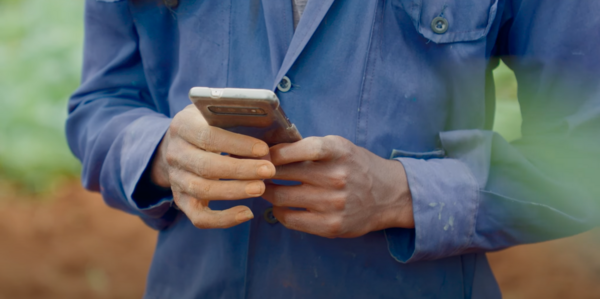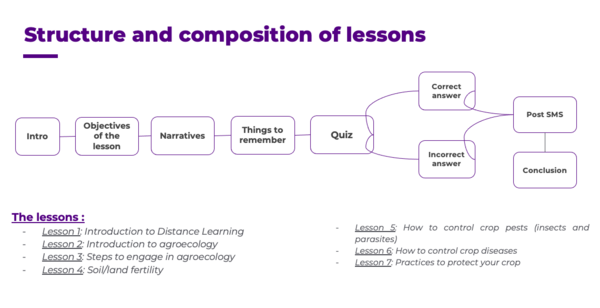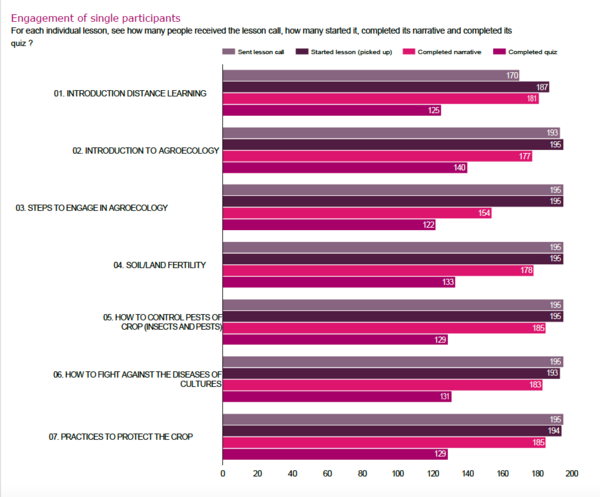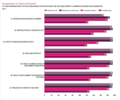The access and use of digital technologies to improve productivity, sustainability and resilience in agriculture have seen immense development worldwide in the past decade. Digitalisation in agriculture takes many forms – from collecting farm-level data via apps to the use of artificial intelligence. How and where farmers access and exchange knowledge are also being digitalised with new technologies like blended learning and information and communication platforms showing promise in the sector. These tools present an opportunity to improve extension to the most rural smallholder farmers.
The SustainSahel project collaborated with the Digital Training Materials Pilot Project, led by FiBL - Research Institute for Organic Agriculture and financed by the Leopold Bachmann Foundation. The project aimed at testing various digital channels and strengthening the capacities of local partners in the field of digital tools for knowledge dissemination and improving agricultural practices and the livelihoods of smallholder farmers in Africa. The Digital Training Materials Pilot Project has mostly tested digital learning using SMS and tablet-based training approaches that equip trainers with digital trainings on tablets in East Africa. Read more about the projects, in their descriptions on FiBL.org and the article on Rural21, all linked below in ‘Further information’.
SustainSahel developed and tested a pilot activity in Mali putting the interactive voice response (IVR) method to the test. To allow illiterate people to also benefit from farming innovations, IVR technology is the state-of-the-art method. IVR is a technology is a computer-operated system, that allows users to interact with a database of prerecorded information using voice commands and the keypad. Some advantages of this method include:
- Efficient, in terms of time and resources (human and financial),
- Provides trainings in the local language and can even be developed for illiterate participants,
- More gender sensitive than the conventional extension service model,
- Complement face-to-face trainings and can reach any farmer with any kind of phone (no need for a smartphone or internet service), and
- Help to scale up existing extension and advisory services
The digital pilot training aimed to educate farmers on the principles, practices, and values of agroecological agriculture based on the Organic Africa Training Manual (linked in Further Information, below) and adapted to the context in the Sahel zone. Seven lessons were provided, the focus of the lessons were agroecology, soil and land fertility, how to control crop pests and diseases and practices to protect your crops. Figure 1 shows the structure and composition of the lessons. The voice messages were shared in the local language, Bambara, however, SMS quizzes were sent only in French.
For the development and adaptation of the training content in the Digital Training Materials Pilot Project, FiBL worked together with AOPP - Association of Professional Farmer Organisations, in Mali, and the technical provider Viamo.
Farmers experience with IVR in Mali
197 farmers participated in the training. 88% of contacts completed at least one lesson. A very satisfactory and consistent level of commitment was seen throughout the course. At the end of this training, 173 farmers were trained. The average completion rate for the voice messages (Bambara) was of 92%, and for the quizzes (French) the number dropped to 67%.
Almost all learners were very satisfied (92%) with the training they received, intend to apply the concepts learned in the training (97%) and are willing to recommend this training to others (96%). Check out figure 2 for an overview of engagement per lesson.
Lessons learned
IVR is a strong digital learning platform that can help scale trainings in organic agriculture. However, having a strong local partner who can sensitize the farmers to the upcoming trainings has proven key to ensure a high participation rate.
What’s next?
To better understand the potential of IVR for widely disseminating agroecology knowhow, an impact evaluation of the digital capacity development in Sikasso is currently being carried out within WP3: Adoption and scaling pathways.
It is based on a cluster randomly controlled experiment, where 39 villages were randomly selected for the intervention group, and 39 villages were randomly assigned to the control group (without any intervention). 5 randomly selected farmers in each intervention village received IVR advice on agroecology. The baseline data has shown that randomisation has produced balanced groups, where farmers from both groups are similar in terms of socioeconomic status and farms from both groups are similar in terms of management.
In February 2023 endline data is collected for the comparative analysis of the two groups. The outcome variables, which can with reason be measured four to five months after the intervention ended, include attitudes, awareness, confidence, knowledge sharing and initial application related to agroecological practices, such as rotations with legumes, mulching, composting or bio-pesticides. The data analysis in the second quarter of 2023 will then reveal if the IVR advice has caused any differences along these outcomes between the two groups. The evidence can be used for further refining the IVR approach and possibly promoting it beyond the pilot… stay tuned!
Written by: Lauren Dietemann, Benjamin Graueb, Christian Grovermann, FiBL - Research Institute of Organic Agriculture
Further information
Organic-africa.net: The African Organic Agriculture Training Manuals
Rural21.com: Improving organic farming practices in Africa with SMS, IVR, app-based training
Fibl.org:






 tap and then scroll down to the Add to Home Screen command.
tap and then scroll down to the Add to Home Screen command.